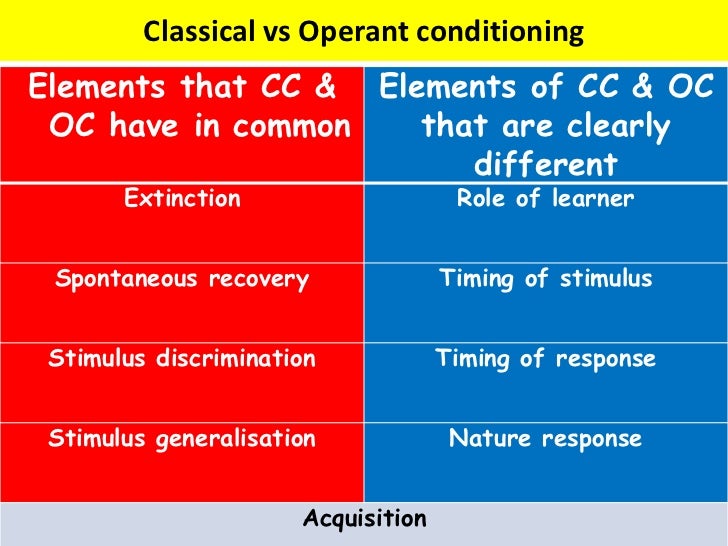
These two forms of learning have their roots in Behavioral Psychology. Classical and operant conditioning both lead to learning.

Among several responses emitted one response is followed by reinforcement.
Difference between classical and operant. Classical conditioning involves associating an involuntary response and a stimulus while operant conditioning is about associating a voluntary behavior and a consequence. In operant conditioning the learner is also rewarded with incentives 5 while classical conditioning involves no such enticements. Both classical conditioning and operant are central to behaviorism but students often get confused about the differences between the two.
Use this study guide to familiarize yourself with some of the major topics related to classical and operant conditioning including key. The main difference between classical and operant conditioning is the way the behavior is conditioned. In classical conditioning a neutral stimulus is paired with a conditioned response.
In operant conditioning a desired behavior is paired with a consequence. The basic difference between classical conditioning and operant conditioning is that Classical Conditioning is one in which the organism learns something through association ie. Conditioned Stimuli and Unconditioned Stimuli.
Conversely Operant Conditioning is the type of learning in which the organism learns by way of modification of behaviour or pattern through. Classical and Operant conditioning can be viewed as two forms of associative learning learning that two events occur together between which there is a significant difference. These two forms of learning have their roots in Behavioral Psychology.
The differences between classical and operant conditioning. Positive Reinforcement in Operant Conditioning. In your newly formed Break Out Room groups do a quick review of the Module 8 Behavioral Learning Theory information from the reading powerpoint and videos on the information specific to what your group has been assigned Classical Conditioning or Operant Conditioning.
The differences and similarities between Classical and Operant Conditioning. Human behaviour is influenced by learning to a great extent. But the term learning does not describe a specific method of gaining knowledge because learning can occur in various ways.
Two of these ways often mentioned in psychology are classical and operant conditioning. Classical conditioning was first observed by the. Das Hauptunterschied zwischen klassischer und operanter Konditionierung ist das Klassische Konditionierung ist ein Lernprozess der das Verhalten eines Individuums in Bezug auf verschiedene innere oder externe Reize verändert während Operantenkonditionierung eine Art des Lernens ist die auf den Verhaltensmustern basiert die als Reaktion auf.
Produce reinforcing or punishing stimuli while in classical conditioning the part of the learner is passive. Additionally to that both types of behaviour modification differ in terms of their order of events. In classical conditioning the stimulus is followed by the response while in operant conditioning the opposite is taking place.
Vander Zanden et al. In classical conditioning learning is passive or the learner is the object while in operant conditioning the learning is active or the learner is subjected to the consequence. In addition classical conditioning associates two stimuli while operant conditioning associates an action with a consequence.
Click to see full answer. Classical and operant conditioning are both similar because they involve making association between behaviour and events in an organisms environment and are governed by several general laws of association - for example it is easier to associate stimuli that are. Classical conditioning relies on stimuli to learn while operant conditioning relies more on consequences.
Classical conditioning is learning that does not require punishment. Whereas operant conditioning has punishment so as to make the person or animal learn from it. The difference between classical and operant conditioning - Peggy Andover - YouTube.
While classical conditioning is S-S type of learning the operant conditioning is S-R type learning. The UCS ie food elicits the natural and biological response of salivation UCR. In operant conditioning the response has to be spontaneously emitted by the organism.
Among several responses emitted one response is followed by reinforcement. There are several distinct differences between classical and operant conditioning. Classical conditioning associates involuntary behavior with a stimulus while operant conditioning associates voluntary action with a consequence.
What are some examples of operant conditioning. The definition of classical conditioning is. An effective conditioning system used to alter behaviour where a form of stimulation is used to achieve a certain type of behaviour The classical vs operant conditioning comparison is all centred on the mechanism of action for each conditioning type.
Its all about the order of stimulus. Psychologists define learning as a long lasting change in behaviour as a result of experience. Classical and operant conditioning both lead to learning.